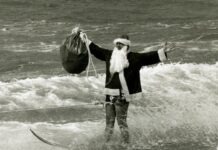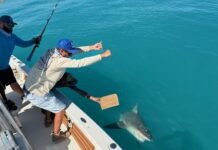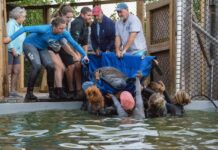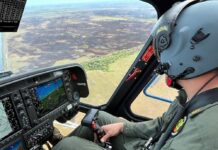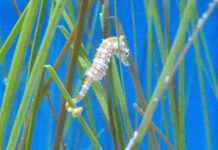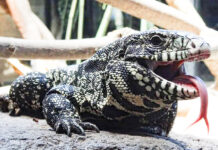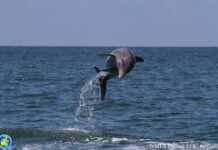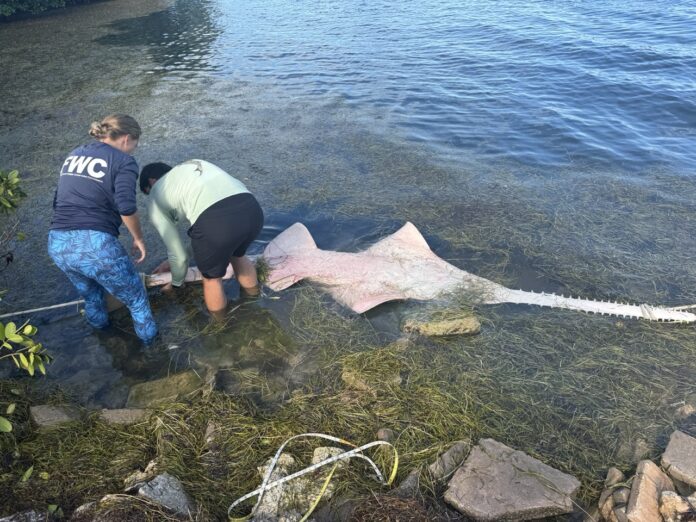
I’m not a morning person, but there are some days when an early wake-up call doesn’t bother me one bit. March 20 was one of those days.
The call wasn’t to tell me about a typo in my paper (Thursday warriors, you know who you are). It wasn’t trying to reach me about my car’s extended warranty. It was from my buddy Capt. Bill Giliberti of Top Notch Sportfishing.
“Hey man, get down to Keys Fisheries. I just left there, but there was a huge sawfish spinning this morning.”
Let the record reflect: If there’s an endangered animal in distress, you can, and should, call me any time, day or night.
But as fast as I threw my clothes on and got down to the marina, I still wasn’t the first one on site. Not even close. Already scouting the area were FWC’s Lauren Lapham and Kristene Parsons along with FSU biological technician Jake Beretta. Knowing the 12-foot ray was last spotted in a shallow basin next to Keys Fisheries’ bar, Lapham got in a kayak for a closer look.
What seemed like just seconds later, they found what they came for: The iconic hedge-trimmer-esque rostrum broke the surface, and the ailing sawfish thrashed through the seagrass until it reached the shore, snagging its teeth in the mangroves.
The three hours that followed were some of the most rewarding moments of my career as a news editor. Doing my best to provide an extra set of hands but otherwise stay out of the way, I watched the experts go to work – assessing whether the sawfish was responsive, making coordinating calls to figure out a game plan, taking measurements and tissue samples, drawing blood and placing two different identifying tags. As it turns out, the female sawfish was first tagged nine years ago – all the way up in Charlotte Harbor on Florida’s west coast.
Reports of dying sawfish and “spinning fish” in the Keys commanded national headlines in 2024. Research efforts since that day have pointed to neurotoxins produced by the Gambierdiscus family of algae as the likely culprit – but the case is far from closed, as good science is always evolving. After all, it’s nearly impossible to “prove” something mere months after it happens, and an ever-changing marine environment adding new complications every day provides a perpetual puzzle.
Thankfully, although reports of sawfish and spinning fish resurfaced in late 2024 and early 2025, they’re nowhere near the levels seen last year. According to a March 4 update from FWC, the agency has received 44 reports of spinning fish since December 2024, compared to more than 500 total reports since December 2023. And with 62 total sawfish mortalities and more than 200 abnormal reports recorded since December 2023, six deaths and 22 reports have come since December 2024.
But as the FWC crew told me more times than I can count last Thursday, fast, accurate, detailed reports are the key to helping animals in distress. That morning, reports from Capt. Bill and Capt. Alex de Melo of Johnny Maddox Sportfishing helped the FWC crew reach the injured animal in just 30 minutes.
I was elated to find out that at 6:30 p.m. – yes, the crew stayed with her all day – she swam away under her own power. But without those reports, and the team standing ready to assist, that may never have happened.
I’m thankful to live in a place where so many locals are invested in helping our precious wildlife, and know what to do to get them the expert care and attention they need. And in a world that seems to love selective science more and more while turning a blind eye to what’s happening in our oceans, I’m thankful that this island chain is filled with people who’ve dedicated their lives to protecting our marine environment through research, education, rescue and rehab. I shudder to think what would happen if they weren’t here.
I’m just a guy who puts words on paper, but for a few hours that day, it was a true privilege to watch and work alongside a few of them.
Photos by ALEX RICKERT/Keys Weekly

